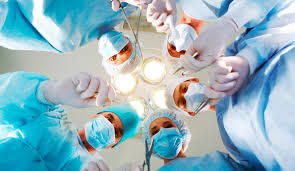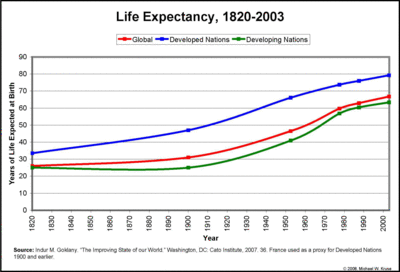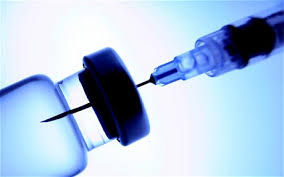
Health & Medicine
The industrial Revolution was a very important time period for changes and improvements. One of these big changes was the Health and Medicine. During the Industrial Revolution there was even a time period that was called the Medical Revolution, since most of the changes happened then. The medical revolution started in the early 19th century. Before the Medical Revolution happened, the health conditions were very poor. In England many children died before their 5th Birthday, and if they did make it through childhood, their life expectancy was very low. The main reasons for this were diseases. The Industrial Revolution had many out-breaks of diseases and it was really easy to get infected. For example, in 1848 in Britain, 52000 people were killed because of an out-break of Cholera. The main reason for this were the poor living conditions, especially in the working-class neighbourhoods. The houses were back to back and overcrowding. The working conditions and the sanitation were very poor. There was poor diet and a lack of clean water. This allowed the diseases to spread easily, since few people had an access to medicine and could afford the doctors. Often the doctors couldn’t help the patients, as no one knew the cause of disease or how to stop them. Sometimes the doctors even worsened the state of their patients, instead of curing them.
During the Medical Revolution many important changes and discoveries were made. Some of the Key changes that happened in Britain during that time are:
-
The Discover of the causes of disease -> In the 1850s a man called Louis Pasteur found out that germs were the cause of the diseases. By studying souring milk and beer that was going bad und the microscope over a long time, he discovered that the tiny organisms that were growing inside the beer/milk, were causing it to spoil. He figured that if these organisms were making the beer spoil, organism similar to them were causing the diseases.
-
Vaccinations -> Since the people knew what was causing the diseases, it was easier for them to find cures for the germs and bacteria. Shortly after he made the discovery of germs, Louis Pasteur started trying to find cures for them. In 1879, he found a vaccine for cholera, which had caused a lot of deaths. He also found the vaccination for anthrax and rabies. However, Pasteur was not the first person to find vaccinations. In 1796 Edward Jenner found the first vaccination for small pox. At the end of the 19th century there were vaccinations for the main killer diseases: smallpox, TB, cholera, typhus, tetanus, pneumonia, plague, anthrax and dysentery.
-
Invention of Aspirin -> Aspirin is a medical advance, that reduces and prevents pain, fever, heart attack and strokes. It was invented in 1899 by Felix Hoffman. Aspirin is made up of acetyl salicylic acid, which comes from willow trees. However, this acid was too dangerous for the human body when used purely, so he manipulated in order to make it safer. Today it is the most used medicine in the world.
-
Invention of Anaesthetics -> Anaesthetics are medical treatments that allow you to feel no pain in the part of you body that it is injected to. One Anaesthetic that was invented in the Industrial Revolution is Ether. It was first invented in 1799, but it was not that successful, since it made the patient vomit and cough the whole time. Chloroform is another Anaesthetic that was mainly used for child births. It was discovered in 1847, but was only started to be really used in 1853, because people were sceptic about it. However, when Queen Victoria insisted of using it, the sceptic was over as no one dared challenge the queen.
-
Surgeries -> When the Anaesthetics were invented, it was much more comfortable and safer for the patients in the surgery. In 1865 antiseptic surgery was invented, which was another improvement to the surgeries. It ensured that the patients did not get infected by more illnesses while in surgery. This was done by sterilising the hands, room, clothes and instruments, before doing the surgery. During and after the surgery the wounds were also sterilised. Other important inventions that helped surgeries to improve were X-Ray, that was invented in 1895 and blood transfusion, which was invented in 1818.
Before the Medical Revolution, Medicine and Health had a great effect on the mortality of children. In England the majority would die before their 1st birthday and 165 per 1000 children were expected to die before reaching the age of 5. The poor health conditions also affected the life expectancy of the people. If you made it through childhood, you were only expected to live up to the age of 25-35. During the Medical Revolution, people started to realize that the cause for this were the poor conditions in the living areas. This encouraged the people to start making changes, and by the end of the 1880s, sewage systems were installed and people started to make sure that the living areas were clean. Hygiene became important and by the 1900s the rate of infant mortality was decreasing rapidly. The houses were heated and clean water was accessible. There was more food, cheaper clothes, vaccinations and clean hospitals. In 1997 the infant mortality in England was 7 per 1000 children dying before their 5th Birthday. The Life expectancy also increased to 76 years.
The Industrial Revolution was a very important time period in England, in order to improve medicine. It helped us realize that the living conditions had to be improved and that the old theories and medicines needed improvement. We have become more curious and have done a lot of research and experiments. All of this made our lives better, safer and in Britain the life expectancy has increased up to 81.5 years. In Britain there are almost no more dirty and overcrowding neighbourhoods. Now there is enough food, clothes, clean water and a proper sewage system for everyone. We can get surgery without having to worry about the safety. There are vaccinations for almost all known diseases and the people are usually healthy and have access to a proper trained doctor.


